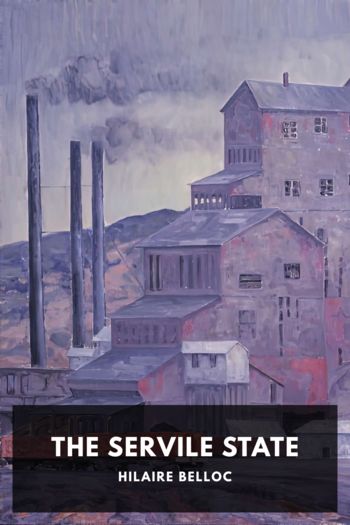The Servile State, Hilaire Belloc [ebook pdf reader for pc TXT] 📗

- Author: Hilaire Belloc
Book online «The Servile State, Hilaire Belloc [ebook pdf reader for pc TXT] 📗». Author Hilaire Belloc
Now this form of wealth was here, more than in any other Western European country, already in the hands of a wealthy land-owning class at the end of the Middle Ages.
It is impossible to give exact statistics, because none were gathered, and we can only make general statements based upon inference and research. But, roughly speaking, we may say that of the total value of the land and its fixtures, probably rather more than a quarter, though less than a third, was in the hands of this wealthy class.
The England of that day was mainly agricultural, and consisted of more than four, but less than six million people, and in every agricultural community you would have the lord, as he was legally called (the squire, as he was already conversationally termed), in possession of more demesne land than in any other country. On the average you found him, I say, owning in this absolute fashion rather more than a quarter, perhaps a third of the land of the village: in the towns the distribution was more even. Sometimes it was a private individual who was in this position, sometimes a corporation, but in every village you would have found this demesne land absolutely owned by the political head of the village, occupying a considerable proportion of its acreage. The rest, though distributed as property among the less fortunate of the population, and carrying with it houses and implements from which they could not be dispossessed, paid certain dues to the lord, and, what was more, the lord exercised local justice. This class of wealthy landowners had been also for now one hundred years the justices upon whom local administration depended.
There was no reason why this state of affairs should not gradually have led to the rise of the peasant and the decay of the lord. That is what happened in France, and it might perfectly well have happened here. A peasantry eager to purchase might have gradually extended their holdings at the expense of the demesne land, and to the distribution of property, which was already fairly complete, there might have been added another excellent element, namely, the more equal possession of that property. But any such process of gradual buying by the small man from the great, such as would seem natural to the temper of us European people, and such as has since taken place nearly everywhere in countries which were left free to act upon their popular instincts, was interrupted in this country by an artificial revolution of the most violent kind. This artificial revolution consisted in the seizing of the monastic lands by the Crown.
It is important to grasp clearly the nature of this operation, for the whole economic future of England was to flow from it.
Of the demesne lands, and the power of local administration which they carried with them (a very important feature, as we shall see later), rather more than a quarter were in the hands of the Church; the Church was therefore the “lord” of something over 25 percent, say 28 percent, or perhaps nearly 30 percent, of English agricultural communities, and the overseers of a like proportion of all English agricultural produce. The Church was further the absolute owner in practice of something like 30 percent of the demesne land in the villages, and the receiver of something like 30 percent, of the customary dues, etc., paid by the smaller owners to the greater. All this economic power lay until 1535 in the hands of cathedral chapters, communities of monks and nuns, educational establishments conducted by the clergy, and so forth.
When the monastic lands were confiscated by Henry VIII, not the whole of this vast economic influence was suddenly extinguished. The secular clergy remained endowed, and most of the educational establishments, though looted, retained some revenue; but though the whole 30 percent did not suffer confiscation, something well over 20 percent did, and the revolution effected by this vast operation was by far the most complete, the most sudden, and the most momentous of any that has taken place in the economic history of any European people.
It was at first intended to retain this great mass of the means of production in the hands of the Crown: that must be clearly remembered by any student of the fortunes of England, and by all who marvel at the contrast between the old England and the new.
Had that intention been firmly maintained, the English state and its government would have been the most powerful in Europe.
The executive (which in those days meant the King) would have had a greater opportunity for crushing the resistance of the wealthy, for backing its political power with economic power, and for ordering the social life of its subjects than any other executive in Christendom.
Had Henry VIII and his successors kept the land thus confiscated, the power of the French Monarchy, at which we are astonished, would have been nothing to the power of the English.
The King of England would have had in his own hands an instrument of control of the most absolute sort. He would presumably have used it, as a strong central government always does, for the weakening of the wealthier classes, and to the indirect advantage of the mass of the people. At any rate, it would have been a very different England indeed from the England we know, if the King had held fast to his own after the dissolution of the monasteries.
Now it is





Comments (0)